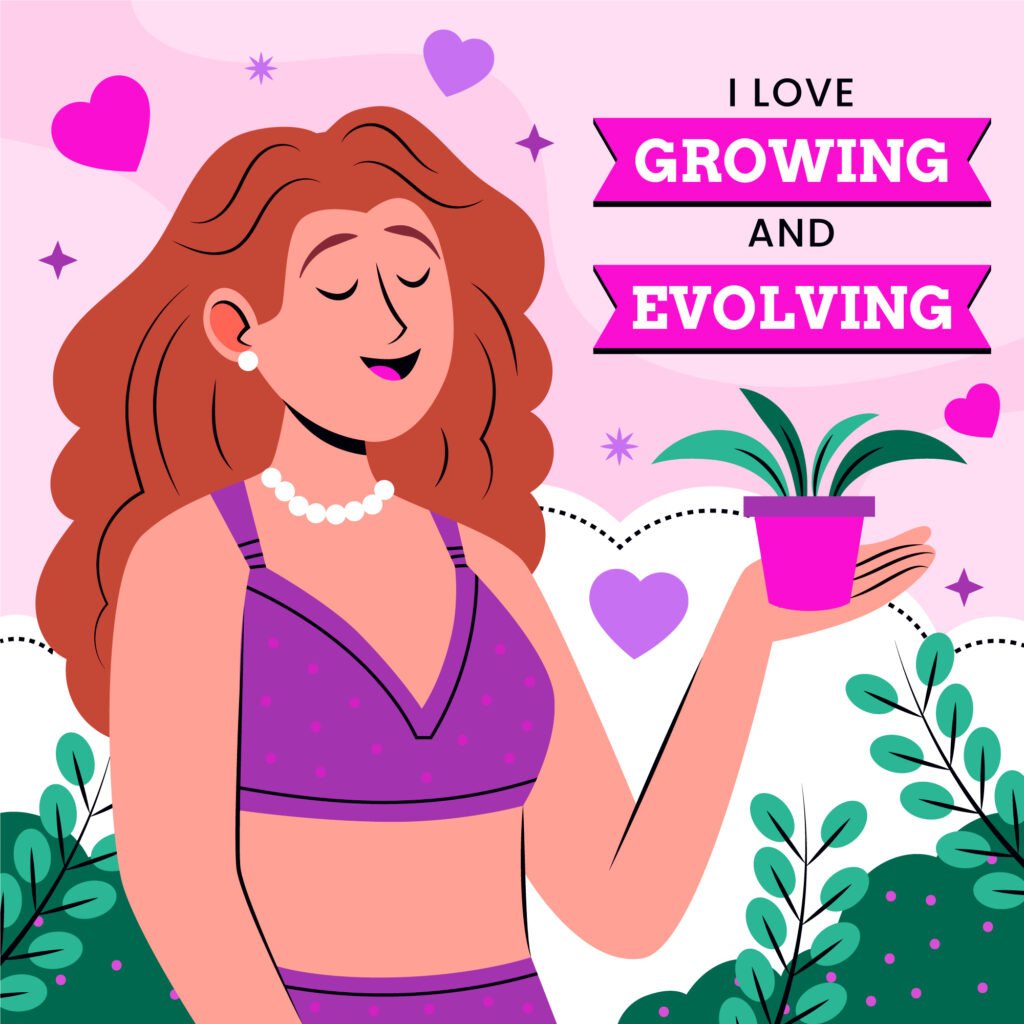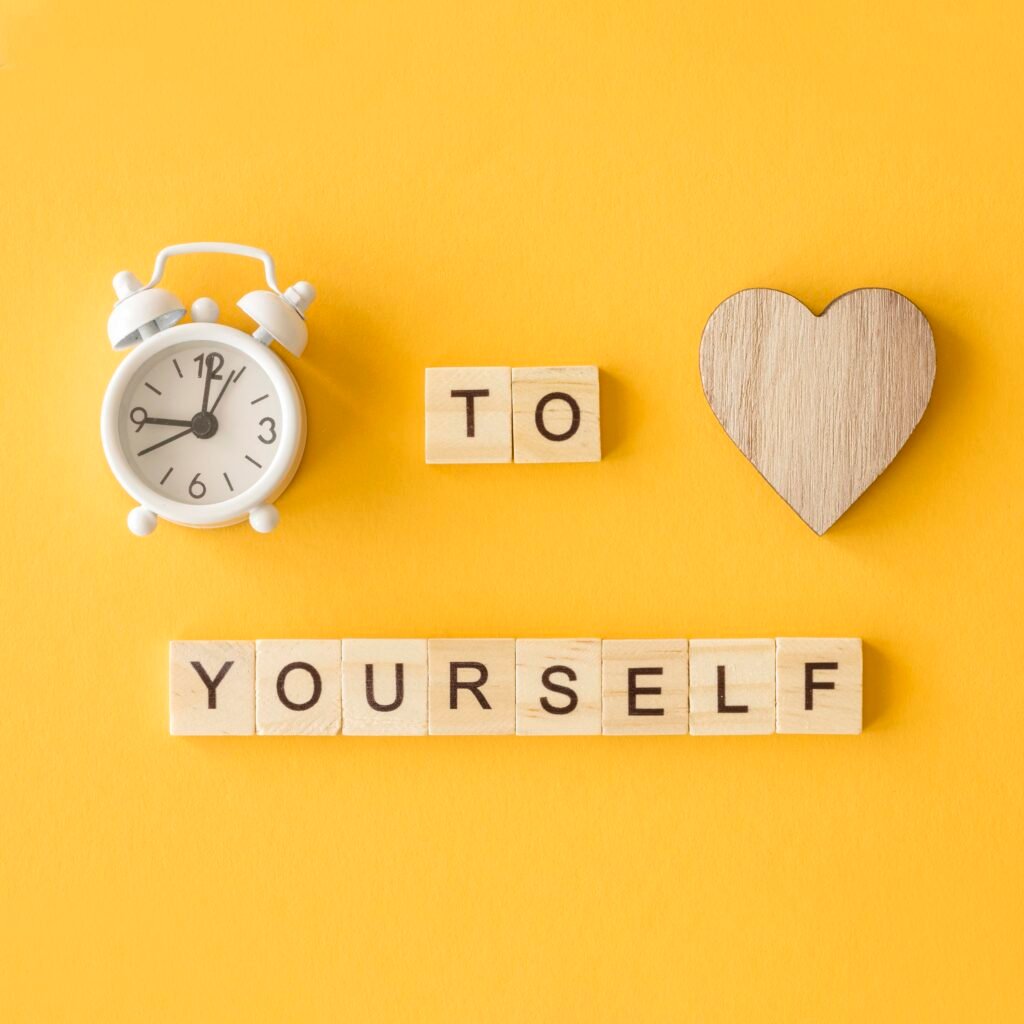Understanding Self-Love
Self-love is the foundation of a fulfilling life. It’s a powerful concept that goes beyond just self-esteem or confidence. At its core, self-love is about developing a deep appreciation for who you are and embracing your strengths and weaknesses.
“Love yourself first and everything else falls into line.”
Lucille Ball
When we talk about accepting yourself fully, we mean acknowledging all aspects of your being – your physical appearance, personality traits, talents, and even flaws. It’s about looking in the mirror and saying, “I accept myself as I am.” This doesn’t mean you can’t strive for growth or improvement, but it does mean you don’t base your self-worth on these external factors.

Treating yourself with kindness is another crucial aspect of self-love. It involves speaking to yourself with the same compassion you’d offer a close friend. Instead of harsh self-criticism, it’s about offering yourself understanding and forgiveness when you make mistakes or face setbacks.
Prioritizing your well-being means recognizing that your needs are important. This includes taking care of your physical health through proper nutrition and exercise but also attending to your emotional and mental health. It might mean setting aside time for relaxation, pursuing hobbies that bring you joy, or seeking therapy when needed.
Many people find these concepts challenging. In our society, we’re often taught to put others first, and this can lead to neglecting our own needs. We may feel guilty for taking time for ourselves or for saying “no” to others’ requests. Additionally, we’re bombarded with messages about how we should look, act, or achieve, which can foster negative self-perceptions.
Harboring negative self-perceptions is common, but detrimental. These might manifest as constant self-criticism, feeling unworthy of love or success, or comparing ourselves unfavourably to others. These negative thought patterns can become so ingrained that we accept them as truth, rather than recognizing them as the distorted perceptions they often are.
Breaking free from these patterns and embracing self-love is a journey. It requires a lot of conscious effort and practice. But the rewards are immense – increased happiness, better relationships, improved mental health, and a deeper sense of fulfilment.
Remember, as psychologist Carl Rogers said,
“The curious paradox is that when I accept myself just as I am, then I can change.”
Self-love isn’t about complacency, it’s about creating a strong foundation from which you can grow and thrive.
The Importance of Self-Love
Self-love isn’t selfish; it’s essential. When we love ourselves, we:
- Build resilience against life’s challenges
- Improve our relationships with others
- Boost our mental and emotional health
- Increase our self-confidence
Research shows that individuals with higher levels of self-compassion experience less anxiety and depression.
Common Barriers to Self-Love
Our inner critic often stands in the way of self-love. It might say:
- “You’re not good enough.”
- “You don’t deserve love or happiness.”
- “Everyone else is better than you.”
Recognizing these thoughts as unhelpful is the first step to overcoming them.
Practical Steps to Cultivate Self-Love
1. Practice Self-Compassion
Treat yourself as you would a dear friend. When you make a mistake, respond with kindness rather than harsh criticism. When we treat ourselves with kindness and compassion, we begin to treat others with kindness and compassion, not out of obligation but from a place of understanding.
2. Set Healthy Boundaries
Learn to say no to things that drain you and yes to what nourishes your soul. It is not easy, especially when we feel the need to be people-pleasers. But recognising that we need nourishing and care too, helps us to thrive.
3. Prioritize Self-Care
Make time for activities that rejuvenate you, whether it’s reading, exercising, or simply taking a relaxing bath. By prioritising self-care, we show to ourselves that we matter and we have value, not only in our lives but in the world as a whole.

4. Challenge Negative Self-Talk
When you notice negative thoughts, question their validity. Replace them with more balanced, realistic perspectives. negative thoughts are just symptoms that we are holding on to beliefs that are negative and unhelpful.
5. Celebrate Your Achievements
Acknowledge your successes, no matter how small. This builds confidence and reinforces positive self-perception. Even making mistakes and learning from them is an achievement. Learning something new is an achievement.
The Science Behind Self-Love
Neuroscience research on self-compassion has provided fascinating insights into how our brains respond to self-directed kindness. This field of study helps us understand the biological basis for the benefits of self-love and compassion.
When we practice self-compassion, several key areas of the brain become active:
- The insula – This region is associated with interoception, or our ability to sense our internal bodily states. Activation here suggests increased self-awareness.
- The anterior cingulate cortex (ACC) – This area is involved in emotional regulation and is linked to our ability to soothe ourselves during distress.
- The prefrontal cortex – This region is responsible for executive function, including decision-making and moderating social behaviour. Its activation during self-compassion practices indicates improved emotional regulation.
- The hypothalamus – This area regulates the release of oxytocin, often called the “love hormone” or “bonding hormone.” Increased oxytocin is associated with feelings of trust, calm, and contentment.
When these regions are activated through self-compassion, several positive effects occur:
- Reduced cortisol levels – Cortisol is a stress hormone. Lower levels indicate decreased stress and anxiety.
- Increased heart rate variability – This is associated with better emotional regulation and resilience to stress.
- Enhanced production of feel-good neurotransmitters – Serotonin and dopamine levels may increase, promoting feelings of well-being and happiness.
Dr. Kristin Neff, a pioneering researcher in self-compassion, explains: “When we soothe our own pain, we are tapping into the mammalian caregiving system.” This system, which evolved to help parents care for their children, can be directed inward, allowing us to be our own source of comfort and support.
Moreover, neuroplasticity – the brain’s ability to form new neural connections – means that regularly practising self-compassion can strengthen these positive brain patterns over time. This leads to long-term improvements in mental health and emotional resilience.
It’s important to note that these brain changes don’t happen overnight. Consistent practice of self-compassion exercises, such as mindfulness meditation or self-compassion breaks, is key to reaping these neurological benefits.
Understanding the neuroscience behind self-compassion not only validates its importance but also provides a compelling reason to incorporate it into our daily lives. By doing so, we’re not just changing our thoughts, but actually reshaping our brains in ways that promote lasting well-being and resilience.
Overcoming Self-Doubt
Self-doubt is indeed a formidable obstacle on the path to self-love. It’s that nagging voice inside that questions our abilities, worth, and decisions. This internal critic can be relentless, often fueled by societal pressures, past experiences, or unrealistic expectations we set for ourselves.
Theodore Roosevelt’s quote, “Comparison is the thief of joy,” encapsulates a profound truth about human nature. In today’s hyper-connected world, we’re constantly exposed to carefully curated highlight reels of others’ lives. Social media, in particular, can amplify feelings of inadequacy as we compare our behind-the-scenes struggles to others’ public successes.
This comparison trap is particularly insidious because:
- It’s often unfair – We’re comparing our whole selves to select aspects of others.
- It’s based on incomplete information – We don’t see the struggles and failures behind others’ successes.
- It ignores individual journeys – Everyone’s path is unique, with different starting points, challenges, and goals.
To overcome self-doubt and avoid the comparison trap through:
- Recognize your unique journey – Acknowledge that your path is yours alone. Your experiences, challenges, and triumphs are valid and incomparable to others.
- Practice mindfulness – Stay present in your own life rather than fixating on others. Mindfulness can help you appreciate your own progress and experiences more fully.
- Set personal benchmarks – Measure your growth against your past self, not against others. Celebrate your progress, no matter how small.
- Cultivate gratitude – Regularly acknowledge what you’re thankful for in your life. This can shift focus from what you lack to what you have.
- Limit social media consumption – Be mindful of how social media affects your self-perception and limit exposure if necessary.
- Challenge negative self-talk – When you catch yourself in self-doubt, question the validity of these thoughts. Are they based on facts or fears?
- Embrace imperfection – Remember that making mistakes and facing setbacks is part of being human. It’s how we learn and grow.
- Seek support – Surround yourself with people who uplift and encourage you. Consider therapy or coaching if self-doubt is significantly impacting your life.
Focusing on your own growth means setting personal goals, acknowledging your progress, and celebrating your unique journey. It’s about becoming the best version of yourself, not a copy of someone else.
As motivational speaker Les Brown said,
“The only person you are destined to become is the person you decide to be.”
This perspective empowers you to take control of your journey, free from the burden of comparison.
Remember, self-doubt doesn’t disappear overnight. It’s a process of gradually building self-trust and self-compassion. Each time you choose self-love over self-doubt, you’re strengthening your ability to do so in the future. Your journey to self-love is uniquely yours – embrace it, nurture it, and watch yourself flourish.
The Role of Mindfulness in Self-Love
Mindfulness is a powerful tool in cultivating self-love and personal growth. At its core, mindfulness is the practice of being fully present and engaged in the current moment, without judgment or distraction. This simple yet profound concept can significantly impact how we relate to ourselves and our experiences.

When we practice mindfulness, we develop the ability to:
- Observe our thoughts – We learn to watch our thoughts arise and pass without getting caught up in them. This helps us recognize that thoughts are not facts, but mental events that come and go.
- Notice our emotions – We become more attuned to our emotional states, recognizing them as they occur without immediately reacting to them.
- Experience bodily sensations – We develop a greater awareness of physical sensations, which can provide valuable insights into our emotional and mental states.
By observing without judgment, we create a mental space between ourselves and our experiences. This space allows us to respond thoughtfully rather than react impulsively to our thoughts, emotions, and situations.
The non-judgmental aspect of mindfulness is crucial for self-acceptance and growth:
- Reducing self-criticism – When we observe our thoughts without judgment, we’re less likely to engage in harsh self-criticism. We can acknowledge negative thoughts without believing them or allowing them to define us.
- Fostering self-compassion – Mindfulness encourages a kind, curious attitude towards our experiences. This naturally cultivates self-compassion, as we learn to treat ourselves with the same kindness we’d offer a friend.
- Enhancing self-awareness – By regularly tuning into our inner experiences, we gain a clearer understanding of our patterns, triggers, and needs. This self-knowledge is essential for personal growth.
- Promoting emotional regulation – As we become more aware of our emotions without immediately reacting to them, we develop better emotional regulation skills.
- Encouraging acceptance – Mindfulness teaches us to accept things as they are in the present moment. This doesn’t mean resignation, but rather a realistic acknowledgement of our current state, which is the first step towards change.
- Supporting growth mindset – By observing our experiences without judgment, we’re more open to learning from them. This fosters a growth mindset, where challenges are seen as opportunities for development rather than threats.
Practical ways to incorporate mindfulness for self-acceptance and growth include:
- Meditation – Regular meditation practice can help develop mindfulness skills.
- Mindful breathing – Taking a few moments throughout the day to focus on your breath can centre you in the present moment.
- Body scans – Systematically focusing on different parts of your body can increase bodily awareness and reduce stress.
- Mindful activities – Engage in everyday activities (like eating or walking) with full attention and presence.
- Journaling – Writing down your thoughts and feelings without judgment can be a form of mindfulness practice.
As Jon Kabat-Zinn, the founder of Mindfulness-Based Stress Reduction, says, “The little things? The little moments? They aren’t little.” Through mindfulness, we learn to appreciate these moments and use them as stepping stones towards greater self-acceptance and personal growth.
Remember, mindfulness is a skill that develops with practice. Be patient with yourself as you cultivate this ability. Over time, you’ll likely find that mindfulness not only creates space for self-acceptance and growth but also enhances your overall quality of life, leading to greater peace, clarity, and contentment.
Integrating Self-Love into Daily Life
Make self-love a habit by:
- Starting each day with a positive affirmation
- Keeping a gratitude journal
- Practising self-forgiveness
The Ripple Effect of Self-Love
As you cultivate self-love, you’ll likely notice improvements in various aspects of your life. Your relationships may deepen, your work performance might improve, and you may find yourself more resilient in the face of challenges.
Remember, self-love is a journey, not a destination. Be patient with yourself as you learn and grow. As you embrace self-love, you open the door to a more fulfilling, authentic life.
By incorporating these practices into your daily routine, you can foster a healthier relationship with yourself and experience the transformative power of self-love.
Ready to Transform Your Relationship with Yourself?
Embark on your journey to self-love today. My transformative coaching programs are designed to guide you through the process of cultivating deep self-acceptance and compassion.
Take the first step towards a more fulfilling life:
➤ Book Your Free Self-Love Discovery Session Now
In this 30-minute session, we’ll:
- Explore your current relationship with yourself
- Identify key areas for growth
- Discuss how my tailored coaching can support your journey
Don’t wait to start loving yourself fully. Click the button below to schedule your session and begin your self-love transformation.
Your future self will thank you for taking this courageous step. Let’s nurture your self-love together!




